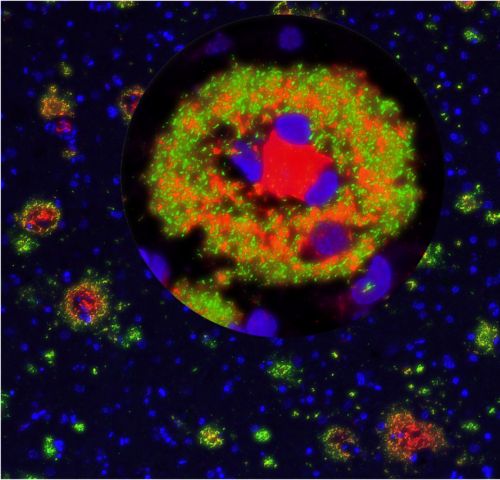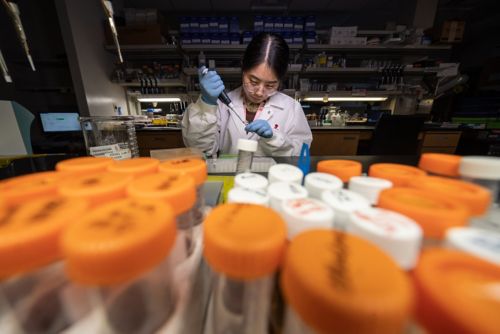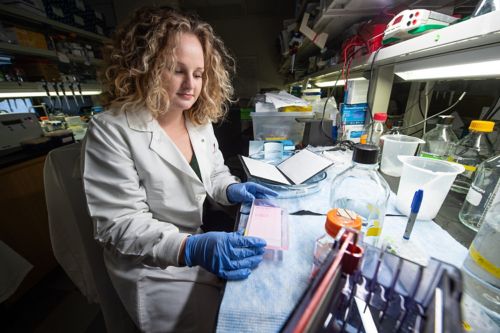Junmin Peng Lab
Using mass spectrometry-based proteomics, metabolomics and systems biology to understand human disease
About the Peng Lab
Our laboratory uses multiple -omics and computational tools to study the full scope of disease. Much of our effort centers on mass spectrometry-based approaches to explore DNA, RNA, proteins, and metabolites. We use these technologies to study cancer, Alzheimer’s disease, and immune responses. Our work impacts everything from discovery of pathogenesis to the development of new treatments.

Our research summary
The goal of our lab is to leverage our understanding of mass spectroscopy to develop novel technologies to better understand the role of molecular components in disease. We then apply these analytical and computational technologies to our studies on the molecular pathogenesis of Alzheimer’s disease and cancer.
Mass spectrometry-based analytical and computational tools
Our laboratory explores all protein and metabolite components of the cell as well as the major modifications that may occur within it, such as phosphorylation, ubiquitination, acetylation, methylation or oxidation. This area of research involves the development of a variety of novel mass spectrometry-based technologies, including proteomic/metabolomic profiling, protein modification analysis, structural proteomics, and bioinformatics.
Our aim in this line of investigation is to obtain the full spectra of temporal, spatial, and structural omics data from cellular, animal, and clinical samples. Our multi-omics approach covers genome, transcriptome, proteome, metabolome, and interactome. The integration of such multi-omics data offers a systems or holistic view for the unbiased identification of central disease gene, protein, and metabolite networks, as well as functional modules and master regulators.
A new project in this area involves taking the data generated from our proteomics and metabolomics studies and integrating it with genomic and RNA transcriptomics data. This initiative involves extensive collaboration with data scientists, biostatisticians, and computational biologists to further advance our analytical pipeline. In addition, we aim to further refine and improve our proteomics and metabolomics tools to make measurements quicker, more specific, more robust, and more affordable.
The technologies we develop and the data we generate are actively applied to our research programs into Alzheimer’s disease, cancer, and immunity.

Molecular pathogenesis of Alzheimer’s disease
In this longstanding research program, our laboratory aims to identify new genes implicated in Alzheimer’s and other neurodegenerative diseases by profiling brain samples. Leveraging our work with analytical and computational technologies and working in collaboration with several NIH-funded national brain banks and numerous collaborators, we recently identified 17 major signaling pathways that have been altered in Alzheimer’s disease.
From those pathways, we homed in on 173 proteins that were associated with disease progression, and then through our comprehensive analysis we narrowed down the field to 10-20 proteins for further study. We are developing a pipeline of stem cell-derived cellular models and mouse models for perturbation with chemical and genetic methods in functional and mechanistic studies. These studies will provide novel insights into the pathogenesis of Alzheimer’s disease for therapeutic intervention and may lead to the discovery of disease biomarkers that would be applicable for precision medicine in a number of diseases.

Cancer proteomics and metabolomics
The third major area of research focus in our laboratory revolves around cancer proteomics and metabolomics. The technologies we develop allow us to analyze clinical tissues, biofluids, cerebellar fluids and other clinical samples for a number of pediatric cancers.
In addition, our pipeline of analytical tools allows us to extend our inquiries across all disease models and leverage this capability to identify biomarkers and explore novel therapeutic approaches. Our proteomic and metabolomic approaches, coupled with our extensive collaboration, allow for the identification of molecules in the biofluid and other samples, which in turn can reflect a particular disease state, treatment efficacy, and/or treatment side effects.
Selected Publications
About Junmin Peng
Dr. Peng earned his BS from Wuhan University in China before earning a PhD in biochemistry from the University of Iowa. After a postdoctoral fellowship at Harvard University, he served a researcher and faculty member at Emory University for 9 years before joining St. Jude in 2011. Dr. Peng is a member of both the Structural Biology and Developmental Neurobiology departments at St. Jude. His research involves using mass spectrometry-based proteomics, metabolomics and systems biology to understand mechanisms of human disease.

The team
Interdisciplinary team of analytical chemists, mass spectrometrists, computer scientists, molecular and cell biologists, and mouse geneticists













Contact us
Junmin Peng, PhD
Member, St. Jude Faculty
Department of Structural Biology
MS311, Room M7430
St. Jude Children’s Research Hospital
Follow Us

Memphis, TN, 38105-3678 USA GET DIRECTIONS